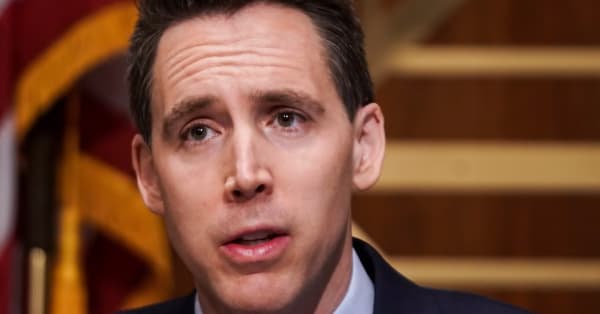Good evening. Voting in the 2020 presidential election ended 57 days ago. The inauguration happens in 21 days.
The Topline
“Stupid is as stupid does,” remarked the great moral philosopher Forrest Gump. This timeless maxim was proved out once again today as Senator Josh Hawley, R-Mo., announced he plans to object during the Electoral College certification process when Congress convenes next week, a move that ensures a delay in the final step to mark President-elect Joe Biden's election victory.
So, is it time to worry? Is this the final form of the GOP coup, long feared? Unless you like long, long odds, I’d wager: no. Hawley’s move means there will be theatrics on January 6th, the last key date in the election process before the inauguration, but barring a complete overthrow of the rule of law and the Constitution, Joe Biden’s victory will still be certified. NPR lays out what will now transpire:
Hawley's announcement paints a clearer picture of what the session on Jan. 6 will look like. Biden will still be certified as the election's winner, but it's now certain there will be a debate and vote in both chambers.
Here's what the process will look like: Both the House and Senate will retire to their own chambers to speak in favor or against the objection. According to the Congressional Research Service, that period should not take longer than two hours.
Each chamber then votes, with a simple majority needed to uphold the objection. Both the Senate and the House must agree to the objection for it to succeed, a requirement that makes any ultimate success on the objection unlikely given the Democrats' majority in the House.
Hawley is a ‘plutocratic populist’, an impostor who seeks to satisfy Donald’s base, presumably to plump up his own ambitions. It’s all the more ridiculous that Hawley himself may have committed an act of voter fraud in Missouri in the last election.


But while Hawley’s maneuver will have no effect on the outcome inside Congressional chambers, it will serve to embolden protestors expected to gather in Washington that day, for a public display of grievance which the President has promised will be "very big" and "wild”. It's not clear just how well attended it will be- the second MAGA march in the Capitol earlier this month was smaller than the first, and it looks like just the bitter enders are still holding out hope. Groups like the Proud Boys, behind the violent skirmishes in prior demonstrations, are no longer welcome at some DC establishments, including the hotel they had come to prefer.
Likewise, there are no indications that Vice President Pence will play a role in advancing the final Trump gambit. He rejected signing on to a ridiculous effort led by Rep. Louie Gohmert (R-Texas) to throw out the procedures for the January 6th certification. His other options are exceedingly limited.

But if you still want to entertain the possibility of a stunning upset and the collapse of the Constitution a week from today, the best description of a possible nightmare scenario for next week I’ve read is by The Washington Post’s David Ignatius:
This threat, while unlikely to materialize, is concerning senior officials, including Republicans who have supported Trump in the past but believe he is now threatening to overstep the constitutional limits on his power. They described a multifaceted campaign by die-hard Trump supporters to use disruptions at home and perhaps threats abroad to advance his interests.
Given the people we know the President is surrounding himself with at the moment, I’m not exactly quaking in my boots. But my eyes are peeled and my ear is to the ground- until Donald Trump is no longer the Commander in Chief, we are all in danger.
Driving the Conversation
Will Pence Do the Right Thing? On Jan. 6, the vice president will preside as Congress counts the Electoral College’s votes. Let’s hope that he doesn’t do the unthinkable — and unconstitutional. Neal Katyal and John Monsky, The New York Times.
He now stands on the edge of history as he begins his most consequential act of leadership. The question for Vice President Pence, as well as other members of Congress, is which side of history he wants to come down on. Can he show the integrity demonstrated by every previous presidential administration? The American people accept a graceful loser, but a sore loser never goes down well in the history books.
How Congress and coronavirus could quash Trump's Electoral College gambit. Kyle Cheney, Politico.
There's little doubt that Biden will be certified as president by the end of the day on Jan. 6 or in the wee hours of Jan. 7, but Trump's allies could cast a cloud over the process — grinding it to a halt, attempting to force votes on alternate slates of Trump-supporting electors and raising untold objections to the proceedings that could disrupt the traditionally ceremonial event. But the lack of clarity also create enormous opportunities for those who wish to limit or prevent the day-long spectacle that Trump’s allies are promising. That could include both Speaker Nancy Pelosi and Senate Majority Leader Mitch McConnell, who has been working to tamp down GOP support for challenges in recent days — drawing Trump’s fury.
Sorry, President Trump. January 6 is not an election do-over. Edward Foley, The Washington Post.
While the Constitution makes each house of Congress the “judge” of elections to its own body, there’s no comparable provision for presidential elections. In fact, it’s the reverse. To prevent the electoral college from being subservient to Congress, the Constitution requires Congress to accept whatever the state decides regarding the appointment of its electors.
The Year of Magical Thinking in American Politics. Ben Ehrenreich, The New Republic.
Political paralysis is undoubtedly preferable to the race straight into the abyss that a second Trump administration would have brought. But the abyss is getting closer whether we move toward it or not. The pain of this coming year will make itself felt in the vast gulf between what needs to be done to stave off catastrophe and what is remotely feasible given the political conjuncture. The virus rages, the planet warms, and here we are: knowing that this broken system cannot save us; knowing that we will be the ones who have to fight; knowing that our losses will be terrible; knowing that we have no other choice.
The System Is Not Working: The Lopsided Election Result, Not The Courts, Saved Our Democracy. Jonathan Manes, Just Security.
Instead, a closer look at this cycle of election litigation paints a much more ominous picture, showing just how close our democracy is to failing. Over the past year, fringe legal theories that could upend future elections have moved to the mainstream. The courts have turned even more hostile to voting rights, standing in the way of even modest accommodations for voters. The president’s post-election litigation has crashed and burned, but it has reinforced the pernicious idea, born from Bush v. Gore, that it is appropriate for courts to step in and second-guess results after the ballots are counted. Our electoral system is a rickety old construction; there’s every reason to believe it could buckle when, inevitably, the votes in a future election are not so lopsided.
Appointments
The President-elect nominated Kathleen H. Hicks to be deputy secretary of defense, the Pentagon’s No. 2 official, and Colin H. Kahl to be under secretary of defense for policy.
The transition team announced several new members of the COVID-19 Response Team, and a number of new additions to the White House Staff:
The first 100+ White House appointees, including those announced today, represent America in the following ways:
61 percent are women
54 percent are people of color
AAPI appointees represent more than twice their share of the national population
LGBTQ+ appointees account for 11 percent of all White House staff
Almost 20 percent of appointees are first-generation Americans
Almost 40 percent of White House senior staff have children at home
Your Moment of Zen
American Interregnum is a pop-up newsletter covering the issues and ideas that will define the Presidential transition period from Nov. 3, 2020, through — we’re all but sure now — Jan. 21, 2021. It is written and edited by Justin Hendrix, Greg Greene, and Melissa Ryan. Have questions or comments? We love your feedback. Reply directly to this email. We read all responses and respond to most.





